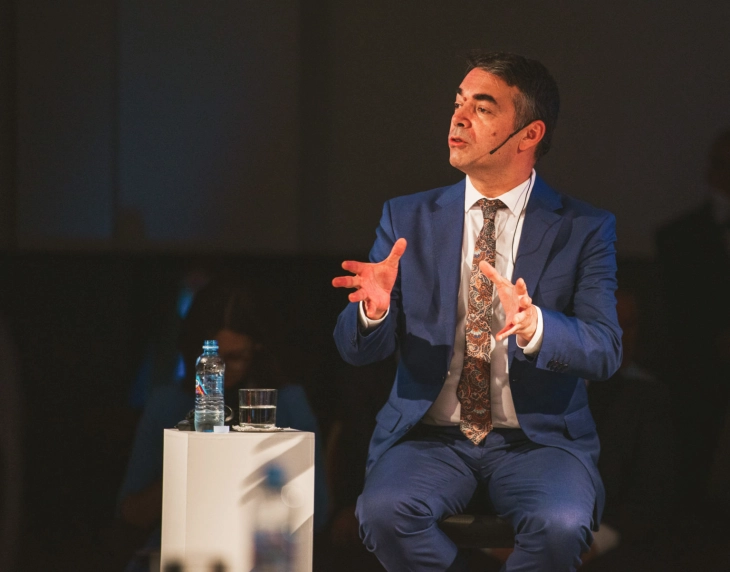This cycle of hope and disappointment is risky and not helpful, Dimitrov tells EWB
- Post By Magdalena Reed
- 18:12, 7 July, 2021

Skopje, 7 July 2021 (MIA) — The EU accession process, supported by political will to change, best supports reforms, and whereas a member state can veto accession, it cannot veto the reform process. The Portuguese proposal is a good foundation for finding a solution with Bulgaria, but we are not negotiating about who we are and what language we speak, Deputy Prime Minister for European Affairs Nikola Dimitrov told European Western Balkans in an interview.
According to the Secretariat for European Affairs in a press release, in the interview Dimitrov speaks about the challenges North Macedonia has faced on its path to EU accession, keeping citizens’ trust in the reforms and in the EU alive as well as the importance of these issues for the region.
“The way to enable a European way of life at home is through reforms. And this is the only sustainable alternative to the brain drain and young people leaving the region,” Dimitrov said.
“We either make this region European — in terms of education, health, equal opportunities, more merit in terms of finding a job, getting a promotion, more justice, more accountability, more freedom — or people think leaving their home country and moving to an EU member state is more attractive.”
According to the Deputy PM, full membership to the EU is the biggest incentive for the Western Balkans “to become a European region in terms of standards at home.”
“On the other hand, the accession process, if used properly, supported by political will to change and transform, is the best reform tool available.
“It will be a challenge to keep the motivation of leaders, of experts, of state administration. But while member states like Bulgaria in our case can veto accession, they cannot veto reforms. I think we have to persist,” he said.
Dimitrov added that the government on Tuesday adopted a substantial revision of the National Program for the Adoption of the Acquis, “which is the biggest strategic document we have when it comes to the Europeanisation,” he said.
“With a high level of ambition, big political focus and capable administration,” according to Dimitrov, North Macedonia can fulfill all the formal criteria for becoming an EU member. “This is doable,” he said.
“The other part of that equation is whether the European Union is ready. As we all know, some countries think that internal reforms of the Union should take place in parallel. And in part, this whole Conference on the Future of Europe has to do with that ambition – for the EU to change from within.
“But these two processes should meet at some point – the process of Europeanisation of the Balkans and the process of internal reforms of the Union.”
Describing the Conference on the Future of Europe as a democratic exercise, he said as many Europeans as possible should be included in the discussions.
“I think that the region should be more included in this Conference because it is not about EU only, it is about Europe. We are definitely Europe. And if Europe is serious about the European perspective that is repeatedly mentioned in so many documents since the big promise in Thessaloniki in 2003 then our region should definitely be a part of this debate. Because we are approaching a moving target – the EU that is changing itself,” Dimitrov said.
Asked about his opinion on whether the Slovenian Presidency would help convince Bulgaria to lift the veto on North Macedonia and Albania, Dimitrov said it would require political will and leadership.
“We’ve had two presidencies in a row trying to resolve this problem,” he said. “The German Presidency and the Portuguese Presidency. I don’t think that Slovenian Presidency will start from scratch. We have good ideas in the form of the Portuguese proposal.”
“If there is recognition that the status quo, the impasse, is damaging,” he continued, “with political will and leadership, I think we can find an European solution that would be good for Macedonian-Bulgarian friendship.”
“But there is an ‘if’,” Dimitrov noted. “Because we did a lot, we’ve worked hard, we can’t really negotiate on who we are and what language we speak.
“For Macedonians in North Macedonia, we are Macedonians who speak the Macedonian language, and frankly if this is an obstacle to starting accession talks, I am fine with not starting accession talks. This makes the European Union less European.”
According to North Macedonia’s Deputy PM for European Affairs, one of the core values of the EU is cultural and linguistic diversity of the continent. “It’s about the dignity of our people. It’s about the right to self-determination. So, questioning the language is definitely not an investment in good neighborly relations,” he said.
Asked about the United States’ vocal support for the EU’s starting talks with North Macedonia and Albania, Dimitrov welcomed the engagement of the US in the region and said a “free, stable and prosperous” Europe was a mutual geopolitical interest.
“Rationally looking, Bulgaria is also a part of this. Under normal circumstances, our neighbors should be our biggest champions. And this sense of togetherness that is gradually spreading in the region, we need to maintain and build upon.
“The Prespa Agreement was praised by the whole democratic world.
“From being ‘a model for the region’ to ‘a big European success’ to ‘a triumph of diplomacy’,” Dimitrov quoted European leaders, and added that “these big words should be supported with action.”
He stressed that the EU should keep its promises “because going through this cycle of hope and disappointment is risky and not helpful.”
“We’ll either have a ‘win-win-win’ [situation] or we’ll have a ‘lose-lose-lose,’ ” Dimitrov said. “So let's see what the next Bulgarian Government decides to do in this context.” mr/







